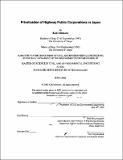| dc.contributor.advisor | Fred Moavenzadeh. | en_US |
| dc.contributor.author | Ishimaru, Koji, 1970- | en_US |
| dc.contributor.other | Massachusetts Institute of Technology. Dept. of Civil and Environmental Engineering. | en_US |
| dc.date.accessioned | 2009-11-06T16:37:03Z | |
| dc.date.available | 2009-11-06T16:37:03Z | |
| dc.date.copyright | 2002 | en_US |
| dc.date.issued | 2002 | en_US |
| dc.identifier.uri | http://hdl.handle.net/1721.1/49798 | |
| dc.description | Thesis (S.M.)--Massachusetts Institute of Technology, Dept. of Civil and Environmental Engineering, 2002. | en_US |
| dc.description | Includes bibliographical references (p. 151-155). | en_US |
| dc.description.abstract | Japan has long been in a recession, and the politicians and the public have a consensus that the administrative and regulative reform is essential for to getting rid of the recession. The highway public corporations in Japan, such as the Japan Highway Public Corporation (JHPC), the Metropolitan Expressway Public Corporation (MEPC), the Hanshin Expressway Public Corporation (HEPC) and the Honshu Shikoku Bridge Authority (HSBA) are considered as ones of the sectors, which have the top priority for reform. The objective of this thesis is to examine the problems of the highway public corporations and to suggest their privatization as a problem-solving driver. First, this thesis analyzes the financial aspect of the highway public corporations by examining the actual financial situation of the corporations. It also analyzes the managerial aspect of the corporation by observing decision-making systems for the development of new highway routes, and examines the degree of political and government intervention. Next, this thesis introduces the role of the public sectors in general and the reason why they do not have an incentive to improve productive and allocative efficiency. Then, it introduces the cases of denationalization of the Japan National Railways (JNR) and of Autostrade S.p.A., a highway concessionaire in Italy. These cases showed significant improvement of productive efficiency and financial soundness, and proved denationalization as one of the most effective tools for the reform of public sectors. By understanding these general facts, privatization, especially denationalization of the highway public corporations in Japan, can be considered as the most possible solution for their financial and managerial reform. This thesis proposes a form of privatization to combine private ownership of profitable routes and vertical separation of unprofitable routes. This solves financial problems and still maintains their autonomous management. This thesis also suggests that the construction of new routes with a social or political objective should be suspended not to affect the financial situation of the privatized enterprises. | en_US |
| dc.description.statementofresponsibility | by Koji Ishimaru. | en_US |
| dc.format.extent | 155 p. | en_US |
| dc.language.iso | eng | en_US |
| dc.publisher | Massachusetts Institute of Technology | en_US |
| dc.rights | M.I.T. theses are protected by
copyright. They may be viewed from this source for any purpose, but
reproduction or distribution in any format is prohibited without written
permission. See provided URL for inquiries about permission. | en_US |
| dc.rights.uri | http://dspace.mit.edu/handle/1721.1/7582 | en_US |
| dc.subject | Civil and Environmental Engineering. | en_US |
| dc.title | Privatization of highway public corporations in Japan | en_US |
| dc.type | Thesis | en_US |
| dc.description.degree | S.M. | en_US |
| dc.contributor.department | Massachusetts Institute of Technology. Department of Civil and Environmental Engineering | |
| dc.identifier.oclc | 50572981 | en_US |
